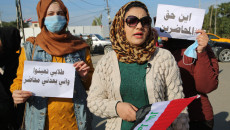The directorate general of education in Kirkuk has nominated three banks for contract-based lecturers to receive their monthly wages following protests by the lecturers who were forced to open a bank account in one bank.
The new admin order circulated by Kirkuk education issued on February 1st states contract-based lecturers have to get a master card from banks of Rashid, Rafdidain or Ashur while earlier only Ashur was valid for 17,000 lecturers, servants and guards.
The monthly salary system is cash in Iraq yet in the last years it was turned into payment via private companies and money exchange offices. Recently, state-employees were asked to get bank account in order to receive their monthly payments.
Samira Hussein, one of Kirkuk lecturers, believes "the file of lecturers in the education of Kirkuk has become complicated, while you find the closest governorate to Kirkuk that announced the settlement of salaries in government banks, except for the education of Kirkuk, which was late in settling salaries."
"I settled the salary in the Rafidain Bank, but the education of Kirkuk rejects this and demands the necessity of settling the salaries in the Assyrian Bank," she told KirkukNow yesterday ahead of settling the issue.
It is the process of transferring the salaries of employees in the private or public sector from manual salaries received from their departments until they are received from public or private banks, through a special account that is opened for the employee in the bank and he withdraws from it using an electronic payment card or receives it in cash from the bank.
Temporary lecturers whom are mainly post-graduates with diploma and bachelor degrees will receive 250,000 Iraqi Dinars ($170) a month for teaching at primary and secondary schools as contract-based teachers. On the other hand, fully employed teachers receive higher salaries, minimum double, and entitled of almost 80% pension salary following a 25-year service.
Teachers used to attend schools four hours a day on average ahead of Covid-19 pandemic which brought in online education for the first time in the history of education in Iraq.
Iraq’s education infrastructure is in ruins in many parts of the country; one in every two schools is damaged and needs rehabilitation, a report by UNICEF about education in Iraq says.
"To complete the procedures for paying the salaries of lecturers and contractors according to the MasterCard system for salaries for the year 2022 and to avoid confusion at work and taking into account the current health situation, provided that the review is within a maximum period of 20 days from today's date. Otherwise, the contractor bears the responsibility for the delay," Kirkuk education statement added.
Ali Hussein, assistant of Kirkuk education director general, said nominating one bank was unwelcomed by the lecturers who were trying to choose other banks.
Following the protests of the lecturers covered in the media including a story by KirkukNow in Arabic posted yesterday, Kirkuk education has decided to provide three options to lecturers instead of one.
In mid-May, the directorate general of education in Kirkuk has decided to receive dossiers of 10,000 lecturers teaching on temporary bases in Kirkuk schools in order to be employed per contracts by the government.
The oil rich city of Kirkuk, Iraq's second largest oil reserves, is ethnically a mixed province of 1.7 million Kurds, Sunni and Shiite Arabs, and Turkmens. It has long been at the center of disputes between the federal government in Baghdad and the autonomous Kurdistan Regional Government KRG.






